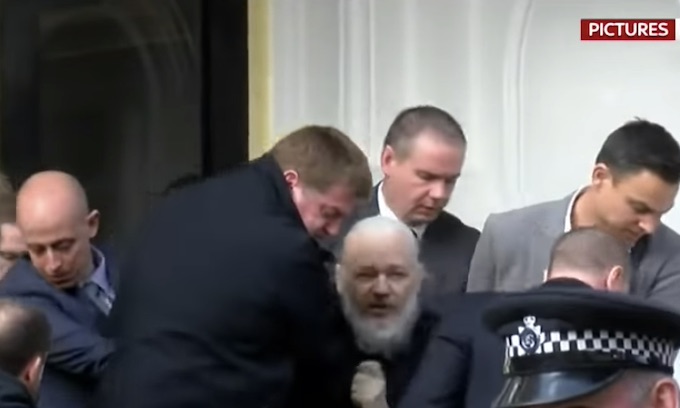So Julian Assange was dragged out of the Ecuadorian Embassy in London in handcuffs, arrested and taken to court — where he was found guilty of breaching bail back in 2012 — and then charged by the United States with conspiring with whistleblower Chelsea Manning (born Bradley Manning) “to break a password to a classified government computer,” according to the indictment.
But let’s hold the phone on the conviction and sentencing of Assange for a moment.
Exactly what did Assange do that, say, journalists protected by credentials from big corporate media entities don’t commonly do during the course of pulling threads of information from their sources?
This is what the Department of Justice documents, quietly filed last year in the Eastern District of Virginia but just now unsealed for the public, allege: that Assange committed conspiracy by encouraging Manning to get him more information, and that Assange possibly, potentially, maybe, helped Manning obtain access to the information on government computers by assisting with the securement of passwords.
The sound bite comes off as if Assange helped Manning hack into government computers.
But that’s hardly proven.
There’s a wide gap between encouraging someone to obtain information of whistleblowing nature and outright physically, surreptitiously inputting passwords on a government computer in order to knowingly tap and steal information that’s off-limits.
But Assange, nonetheless, faces extradition to the United States to face the more serious conspiracy charges.
There’s a real need for a wait and see on this — a real need for cooler heads to not convict in the court of public opinion.
“During the conspiracy,” the feds’ docs accuse, ABC News reported, “Manning and Assange engaged in real-time discussions regarding Manning’s transmission of classified records to Assange. The discussions also reflect Assange actively encouraging Manning to provide more information. During an exchange, Manning told Assange that ‘after this upload, that’s all I really have got left.’ To which Assange replied, ‘curious eyes never run dry in my experience.’ ”
That’s it? So what?
Assange’s attorneys are painting it like their client is simply a journalist, prodding a source to reveal more information. And that’s as good a defense as any — because, well, Assange was the editor of WikiLeaks, where he posted the info he received from Manning.
Much of that information proved embarrassing to the political world. But that’s not Assange’s fault.
This is not to say Assange is a hero to the truth — or a traitor to any sort of cause or country, for that matter.
But this is to say that if Assange is considered a journalist, an extradition seems odd. Even if Assange isn’t considered a journalist, an extradition to the United States to face conspiracy charges demands he be greeted with an innocent-until-proven-guilty trial.
What’s rushing into the press, into the public consciousness, is anything but. Some skepticism and scrutiny of the government’s actions seem warranted. At least let’s take a few seconds to go, “say what?” before sending the guy to the guillotine and passing out the American flag lapel pins as if national security were restored.
• Cheryl Chumley can be reached at [email protected] or on Twitter, @ckchumley.
© Copyright (c) 2019 News World Communications, Inc.
—-
This content is published through a licensing agreement with Acquire Media using its NewsEdge technology.



















Recent Comments